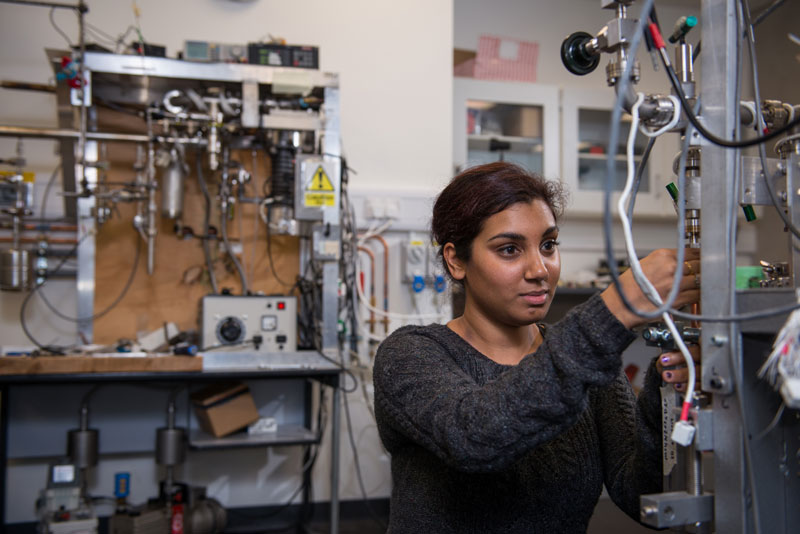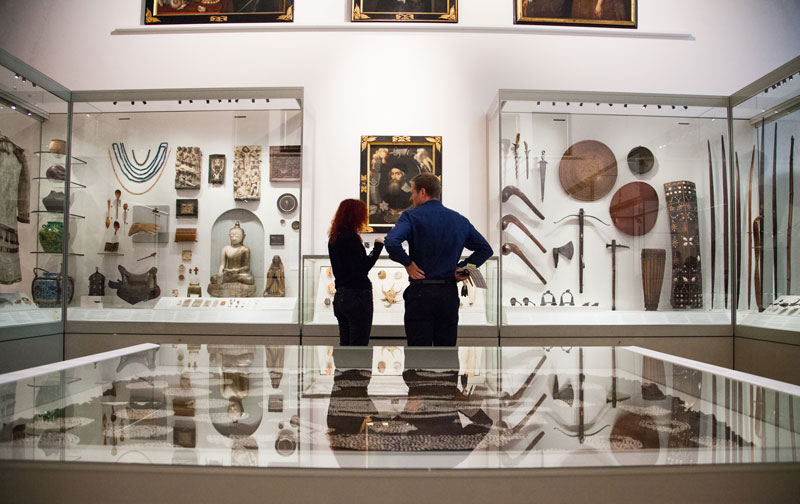The Wolfson Foundation’s commitment to excellence
Support from one of the UK’s largest grant-making charities is helping to transform the life and work of the University.
‘It seems to me that the challenges facing higher education at the moment mean that philanthropic funding is as important, if not more important, than it has ever been,’ says Paul Ramsbottom, Chief Executive of the Wolfson Foundation.
‘And I think of challenges in two ways,’ he continues. ‘Firstly, financial challenges, particularly around Brexit, as well as tuition fees and earned income, and secondly, big societal challenges – issues like climate change and artificial intelligence, in which university research will play an absolutely critical role. To be in a position to fulfil that role, though, I think that universities will need philanthropic support, and quite significant philanthropic support for that matter.’
‘The beauty of philanthropy for universities is that it’s the money which is the most flexible, and because of that, it really allows vision and dreams to be fulfilled’
Established in 1955, the Wolfson Foundation awards grants to support excellence in the fields of science, health, education and the arts. It has a rigorous decision-making process, with funding awarded on the basis of expert peer review. This, Paul says, ‘ensures that our emphasis on excellence and quality isn’t just a mantra.’
The foundation has a long-standing relationship with Oxford. Its first grant to the University, to endow a chair in metallurgy, was awarded in 1957; its most recent, to support a new national thin-film cluster facility for advanced functional materials, was announced in July. Over the course of six decades, the foundation has given more than £100 million (in real terms) to approximately 350 individual projects at Oxford.
For Paul, the success of the partnership stems from a sharing of core values. ‘I think this emphasis on excellence and quality means that our two organisations have an absolute synergy,’ he says. ‘Oxford’s commitment to excellence chimes very well with the foundation’s wish to fund infrastructure that underpins research of the highest international quality.’
Of the £30 million plus awarded nationally each year, roughly 85% is allocated to capital infrastructure. The reason for this, Paul explains, is the increasing scarcity of traditional forms of statutory funding: ‘All of the advice we get in talking to universities is that it is becoming more and more challenging to secure funding for buildings and equipment. At the same time, we know that in order to maintain status as an internationally competitive research institution, it is vital to keep investing in infrastructure. That’s hard to do at any time, but it’s particularly difficult at this juncture.’
 The Noble Lab is one of a number of laboratories in the Earth Sciences Building that was supported by the Wolfson Foundation. Photo by John Cairns
The Noble Lab is one of a number of laboratories in the Earth Sciences Building that was supported by the Wolfson Foundation. Photo by John Cairns
A substantial number of buildings in Oxford have either been constructed or equipped with the foundation’s support, including Wolfson College, the Earth Sciences Building, the Mathematical Institute, the Beecroft Building and the Stroke and Dementia Centre. The latter, which is being built on the John Radcliffe Hospital site, will enable researchers to undertake work that could have life-changing outcomes for patients.
‘Having a dedicated building for research into the prevention of stroke and dementia is going to be really advantageous, not only for the researchers, but also for the patients who take part in the research,’ says Paul. ‘It’s such an important area; the rates of both stroke and dementia are at such high levels that if the centre can provide new insights into them, it will have a profound impact on society.’
As part of its mission to fund places, the foundation also partners with central government to deliver the DCMS/Wolfson Museums and Galleries Improvement Fund. Established in 2000, the fund supports national and regional museums to improve the quality of their displays, enhance exhibition spaces and public access, and increase awareness of their collections.
To date, the partnership has committed some £2 million to the improvement of Oxford’s own cultural institutions, supporting projects that range from the redisplay of the Ashmolean’s founding collections, to the installation of innovative digital technology at the Pitt Rivers Museum.
 The Ashmolean Story Gallery was supported by a grant from the DCMS/Wolfson Museums and Galleries Improvement Fund. Photo by John Cairns
The Ashmolean Story Gallery was supported by a grant from the DCMS/Wolfson Museums and Galleries Improvement Fund. Photo by John Cairns
Although infrastructure projects take the lion’s share of funding, the foundation is keen to support people too. Oxford is one of nine UK universities involved in the Wolfson Postgraduate Scholarships in the Humanities Programme, which was established in response to concerns about funding for the humanities as well as the impact of increased undergraduate debt on postgraduate studies.
The programme has benefited 39 DPhil students at Oxford so far, with scholarships providing essential support as they conduct innovative research in the fields of history, languages and literature. ‘They’re always really fascinating, really talented people,’ comments Paul. ‘The ambition is that they are the research leaders of the future.’
On a personal note, Paul says he feels privileged to play a role in supporting the wide-ranging work being undertaken at Oxford: ‘I tend to get one or two days in the city each year wearing my Wolfson hat. Walking around, I know I’m never far away from something that has had some kind of Wolfson influence, and I have to say, that does feel very nice indeed.’
GIVE TO OXFORD